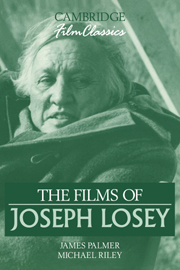Book contents
- Frontmatter
- Contents
- Acknowledgments
- 1 “Pictures of Provocation”
- 2 “What Beauty Is There, What Anguish”: King and Country
- 3 “An Extension of Reality”: The Servant
- 4 “The Inner Violence”: Accident
- 5 “The Annihilation of Time”: The Go-Between
- 6 “The Arrival of Strangers”: The Romantic Englishwoman
- 7 “No Ready-Made Answers”
- Notes
- Filmography
- Works Cited
- Index
4 - “The Inner Violence”: Accident
Published online by Cambridge University Press: 16 January 2010
- Frontmatter
- Contents
- Acknowledgments
- 1 “Pictures of Provocation”
- 2 “What Beauty Is There, What Anguish”: King and Country
- 3 “An Extension of Reality”: The Servant
- 4 “The Inner Violence”: Accident
- 5 “The Annihilation of Time”: The Go-Between
- 6 “The Arrival of Strangers”: The Romantic Englishwoman
- 7 “No Ready-Made Answers”
- Notes
- Filmography
- Works Cited
- Index
Summary
The rich command of his medium and deepening understanding of the themes of power and privilege that are evident in King and Country and The Servant anticipate Losey's more ambitious achievements in Accident. The heightened tension between evocative imagery and understated language that pervades the first of Losey's collaborations with Harold Pinter is even more striking in their second film together, which was adapted from a novel by Nicholas Mosley. Similarly, the intensely personal revelation of character that marks the story of Hamp and Hargreaves is also at work. Compared with these earlier films, however, the world of Accident seems almost uneventful except for the fatal accident with which the film begins; there are no conflicts as overt as the court-martial or the corrupt struggle between master and servant. Instead, destructive contests are masked by calm surfaces profoundly at odds with concealed passions. Beneath the restrained, civilized forms of English university life, passion and power prove indivisible; sexual desire and deception compel moves and countermoves whereby advantage is secretly won or lost. The tension between what is spoken and what unspoken, between what is desired and what denied is made palpable by a narration in which, as Pinter described it, “everything happens, nothing is explained. … Just a level, intense look at people, at things. As though if you look at them hard enough they will give up their secrets” (Taylor 1966, 184).
- Type
- Chapter
- Information
- The Films of Joseph Losey , pp. 64 - 89Publisher: Cambridge University PressPrint publication year: 1993



